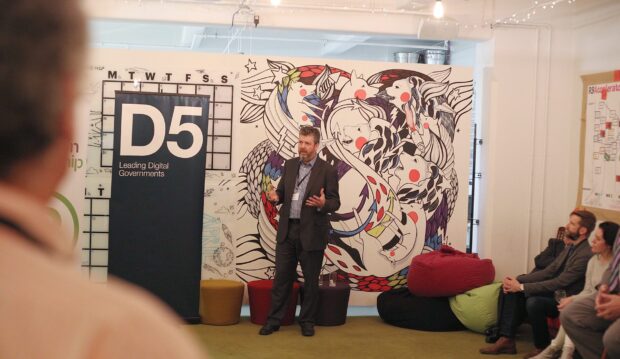
In June I took part in a Digital 5 (D5) Officials meeting in Wellington, New Zealand. It was my first long haul journey and the idea of spending 26 hours on a plane was daunting. But 200 years ago the 12,000 mile trip would have taken me 100 to 120 days.
Human endeavour, innovation and technology has made travel easier, safer, faster. I could use my phone throughout the flight and receive instant responses from colleagues even though I was 1000s of feet above the ground and 1000s of miles away.
It should be as easy for me, and everyone else on the flight, to use government services across continents as it was to contact people, work on my laptop, or watch a movie on the flight to New Zealand. And the UK Government is committed to making this happen.
That’s why in 2014 we founded the D5, with Estonia, Israel, New Zealand and South Korea. Our governments work together to share best practice, develop solutions to common issues we face, and build digital public services.
Openness and collaboration
We get things done by learning from each other, and sharing past mistakes as openly as we share successes. To date, we have shared code and expertise and worked together on issues such as teaching children to code, digital signatures, and using technology to improve emergency services.
But there is so much more we can collaborate on. Our meeting in June 2016 focused on work we will do together on user needs; digital identity and digital trust; building global digital government; and talent attraction and retention.
Custom meets cutting edge
The meeting was seamlessly organised by Emma Gawen, formerly of GDS, who is working currently at New Zealand’s Department of Internal Affairs. It took place in Wellington’s Te Papa Museum and kicked off with a traditional “Powhiri” ceremony and “Hongi”, a touching of foreheads and noses.
“Hongi” can be translated as “sharing of breath”, and was a fitting beginning to a meeting based on openness, sharing ideas and collaborative working. And Te Papa itself was an apt venue. Te Papa aims to connect more people with New Zealand cultures and history through technology.
Where better for the D5 to come together to share best practice, develop technology solutions that serve user needs and lead the way in digital government?
New Zealand Minister Peter Dunne gave a powerful speech that reminded us why the D5 is so important. Working together not only helps our 5 countries, the work we do drives global digital reform.
Through the D5 we can support other countries to build their digital government, help businesses to succeed in world markets, and make it easier for people to use their government’s services from anywhere in the world.
Looking further
But the D5 cannot do this alone. We must look beyond our 5 countries to learn from other countries who are doing great things and to support governments at early stages of their digital journey. In Wellington we took an action to expand the group. Watch this space for further information on this.
Governments cannot do this alone. We must work with academia, the private sector and civil society to understand what issues our citizens face, and how we can use technology to address those issues. We heard about some of the great work the New Zealand Innovation Partnership and Figure.NZ are doing to support and promote cross-sector innovative digital projects and to democratise data by making it available to everyone.
We did a lot of groundwork for the D5 Ministerial Summit to be held in November in Busan, South Korea. The UK is leading a working group on talent attraction and retention, which looks at how we attract the best digital talent into government and how we build digital capability in the Civil Service.
I presented on some of the work we are doing in this area, and we will work with colleagues in GDS, New Zealand and Israel to drive this agenda. We know that the war for digital talent is an issue for most governments, and will share our results with countries around the world.
In Wellington I also visited the British High Commission, where I met with Helen Smith, UK Deputy High Commissioner, and some of her team. I was really impressed by the team’s interest in digital reform, it’s great to see that the agenda is being pushed by posts across the world.
Visiting the Commission reminded me of how important it is that GDS, and all departments, keep our overseas colleagues informed of the work we do and draw on their knowledge of what users need. It also reinforced the responsibility we have to build cross-border public services that can be accessed by UK citizens from anywhere in the world.
Next steps
Andy Beale, Chief Technology Officer, HMG recently blogged that “to make change happen we must collaborate”.
We must learn from others not only across government departments, or across industry, but across the world. The D5 is an important conduit for such collaboration. I left New Zealand with a renewed determination to produce results that we will share in November at the Busan Summit and to driving global public services based around user needs.
The return flight to London had some severe delays and was not as smooth as the flight out. And likewise, building global digital services will not always go smoothly, we will make mistakes, things will go wrong. But by working with others we will succeed, and in that spirit, I ask you to keep telling us of your user needs and how we can build 21st century public services fit for the 21st century citizens we serve.